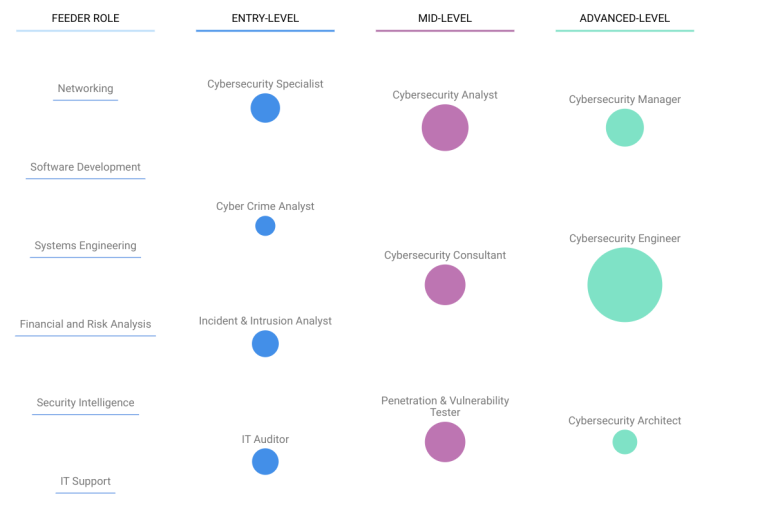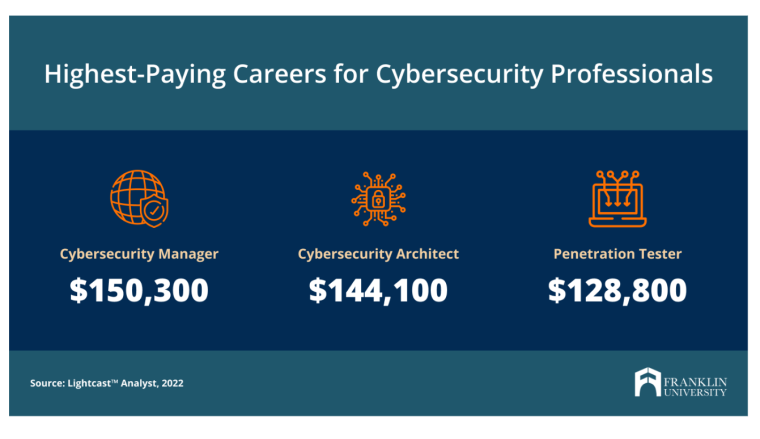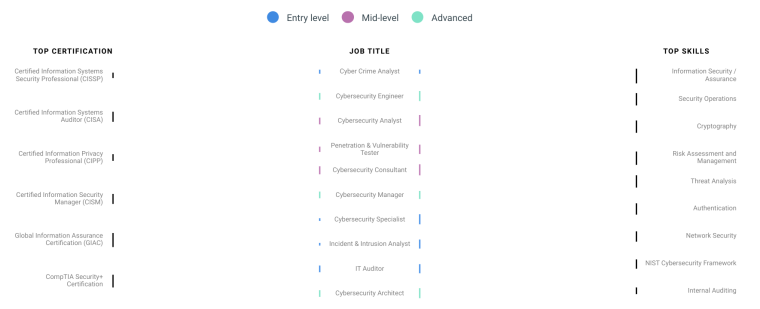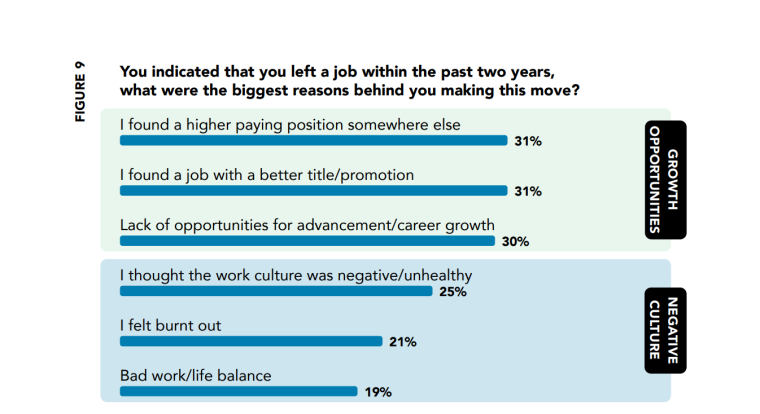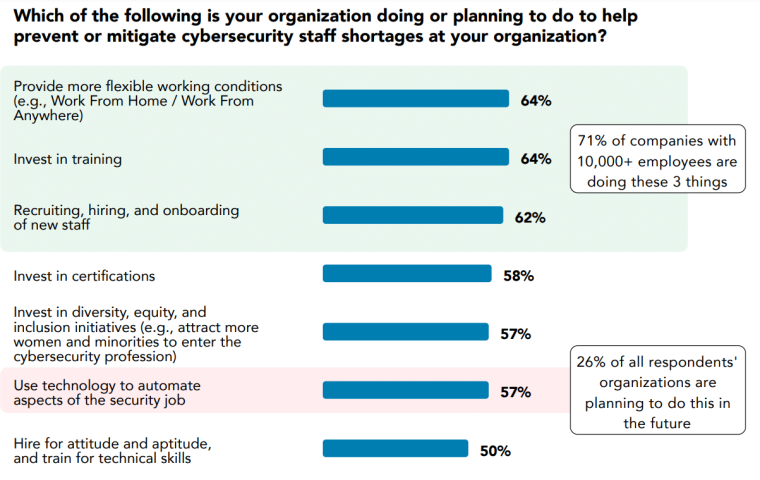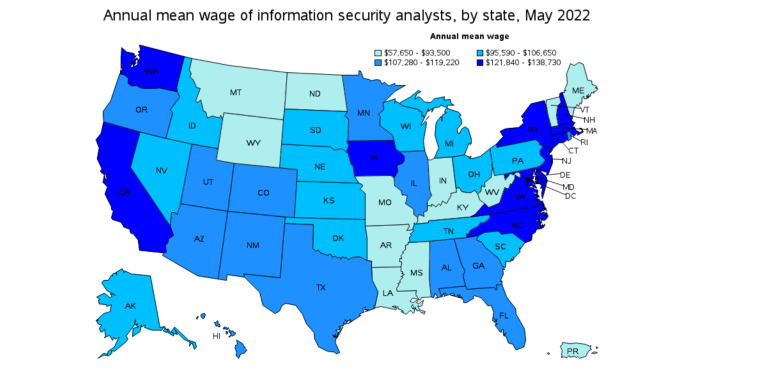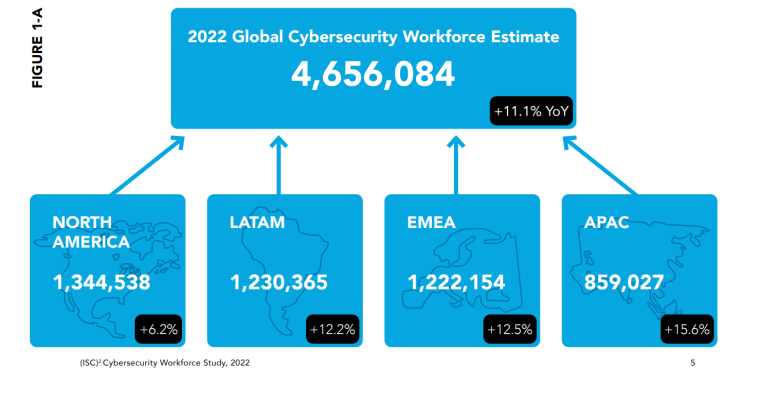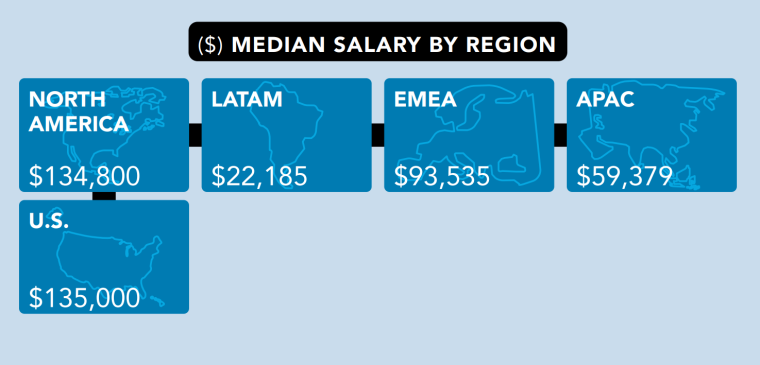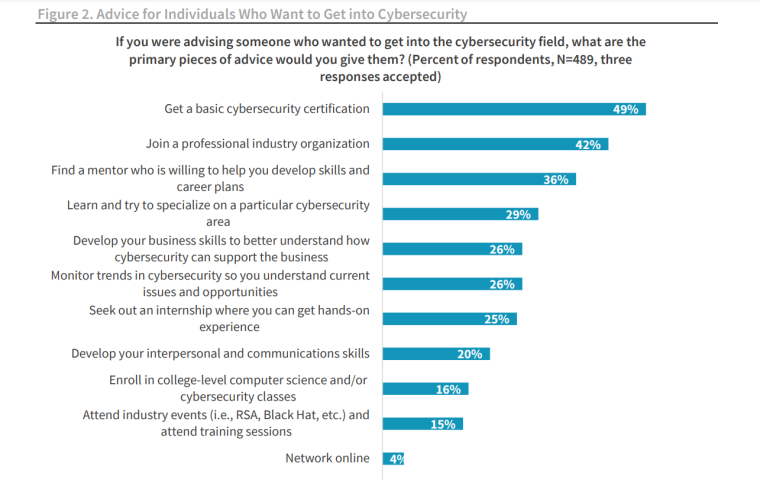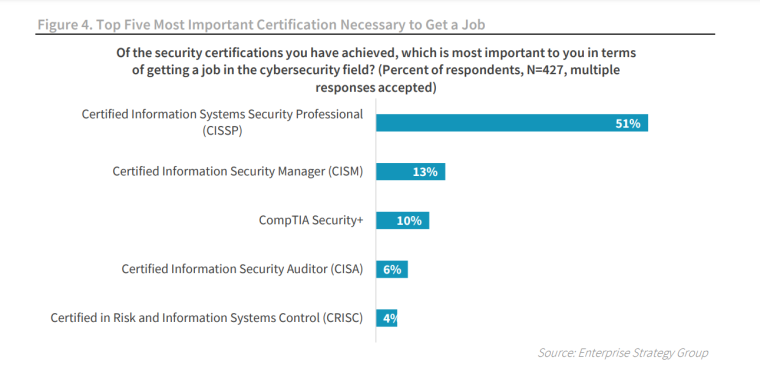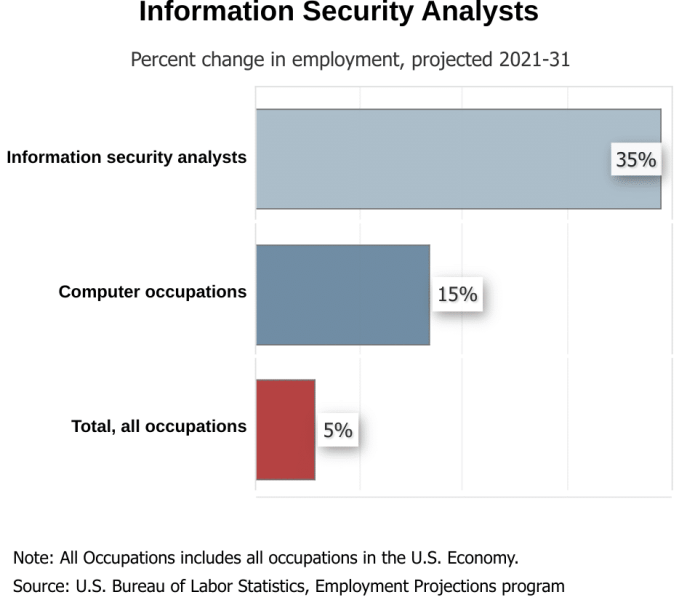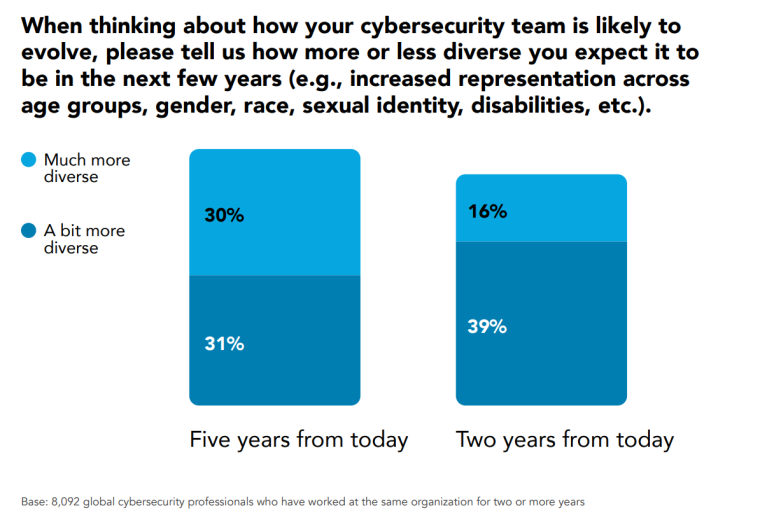In the ever-evolving landscape of digital threats, cyber security professionals play an indispensable role in safeguarding organizations from potential risks and costly breaches.
As the demand for talent continues to surge, keeping up with the state of cyber security salaries is crucial for making informed career decisions.
If you’re wondering what the average cyber security salary is, you’re in the right place.
This guide provides valuable insights and salary ranges, helping you gain a clear understanding of the typical cyber security salary for roles such as analysts, engineers, and more.
Key Highlights on Cyber Security Salaries
- Average Cyber Security Salary Per Hour: Between $119,860 and $135,000 annually, translating to about $57.63 to $70.31 hourly.
- Entry-Level Cyber Security Salary: The Bureau of Labor Statistics (BLS) did not provide specific figures for entry-level salaries, but the average hourly rate across all experience levels in 2022 was $57.63.
- Cyber Security Auditor Salary: Not specifically mentioned, but falls within the general range for cyber security professionals.
- Cyber Security Technician Salary: Not detailed, but likely aligns with the average salary range provided.
- Work Hours: The article does not directly address whether cyber security jobs are typically 9-5, but given the demanding nature of the field, hours can vary significantly, including the need for on-call or overtime hours in response to security incidents.
- Salary Factors: Salaries vary based on experience, role, industry, employer size, and location. The BLS notes an increase in the average salary from $113,270 in 2021 to $119,860 in 2022.
- Global Comparison: (ISC)²’s study shows US cyber security professionals earn an average of $135,000, indicating regional salary differences.
- Trend: There’s a noticeable increase in cyber security salaries, reflecting the growing demand and importance of the field.
Cyber Security Salaries
The average cyber security salary is between $119,860 and $135,000 per year.
This comes up to around $10,000 to $11,250 monthly or between $57.63 and $70.31 hourly. However, cyber security salaries vary depending on factors such as:
- A candidate’s experience: Candidates with more experience tend to earn higher salaries.
- The role: Professionals in senior-level roles tend to earn more than those in entry-level roles.
- The industry: Cyber security professionals in certain industries tend to earn higher salaries than those in other industries.
- The size and scope of the employer: Larger companies typically offer higher salaries than smaller companies.
- Location: Cyber security professionals in certain states tend to earn higher salaries than those in other parts of the country.
The Bureau of Labor Statistics (BLS) pegged the average cyber security salary at $119,860 per year in 2022. That’s up from an average of $113,270 per year in 2021.
So, how much does cybersecurity make an hour?
According to BLS, the average hourly rate was $57.63 in 2022. That’s up from $54.46 per hour in 2021.
The median annual salary was also $112,000 in 2022. That’s a median average hourly rate of $53.85 or a median monthly salary of $9,333.
In 2022, (ISC)2 surveyed 11,779 cyber security professionals throughout North America, Latin America (LATAM), and the Asia-Pacific region (APAC), for its Cyber Security Workforce Study.
The study found that cyber security professionals in the US earned an average of $135,000 per year.
Meanwhile, major salary comparison and recruitment sites report that the average cyber security salary ranges between $96,000 and $128,870.
| Pay Comparison Site | Average Cyber Security Salary per year |
| Payscale | $96,000 |
| Salary.com | $98,014 |
| Talent.com | $120,000 |
| ZipRecruiter | $128,870 |
| Glassdoor | $102,291 |
CyberSeek, a joint initiative of the National Institute of Standards and Technology’s (NIST) NICE program, Lightcast, and CompTIA breaks down the average cyber security pay by roles and career progression. As of 2023:
- Professionals in entry-level roles earn an average of $96,739 per year, which is $6,381 per month or $46.50 per hour.
- Professionals in mid-level roles earn an average of $107,059 per year which is $7,291 per month or $51.47 per hour.
- Professionals in advanced-level roles earn an average of $135,768 per year which is $9,339 per month or $65.27 per hour.
As per BLS, the top-paying industry for cyber security professionals was web search portals, libraries, archives, and other information services.
The sector paid professionals an average of $165,110 per year or $79.38 per hour. This was followed by the computer and peripheral equipment manufacturing industry, which paid cyber security professionals $161,240 per year or $77.52 per hour.
| Industry | Avg Hourly Rate | Avg Yearly Pay |
| Web search portals, libraries, archives, and other information services | $79.38 | $165,110 |
| Computer and peripheral equipment manufacturing | $77.52 | $161,240 |
| Social advocacy organizations | $73.29 | $152,450 |
| Motion picture and video industries | $72.78 | $151,380 |
| Motor vehicle manufacturing | $69.12 | $143,770 |
The BLS estimates that cyber security professionals work 40 hours a week.
Over 88% of cyber security professionals work more than 40 hours per week and a further 71% report they’re on call around-the-clock. The number of hours worked increases for those in leadership roles, with CISOs working an extra 10 hours a week.
Roles in Cyber Security and Salaries
Cyber Security Starting Salary
The average cyber security starting salary is between $67,059 and $75,578 per year.
Entry-level candidates who hold cyber security degrees tend to earn higher starting salaries. Those looking to break into the field and those looking to shift careers from areas such as health, IT, business, or finance can look into the following entry entry-level certifications:
- Microsoft Certified: Security, Compliance, and Identity Fundamentals
- CompTIA Security+
- ISACA Cyber Security Fundamentals
- (ISC)2 Systems Security Certified Practitioner (SSCP)
- GIAC Information Security Fundamentals (GISF)
Cyber Security Technician
The average cyber security technician salary is $64,845.
A cyber security technician is responsible for the day-to-day maintenance and security of computer networks and systems. They install and configure security software, monitor for threats, and respond to security incidents. A cyber security technician may also work with other IT professionals to develop and implement security policies and procedures.
Recommended certifications:
- The Certified Cybersecurity Technician (C|CT)
Cyber Security Analyst
The average cyber security analyst salary is $107,517 per year.
A cyber security analyst is responsible for protecting organizations from cyber attacks by monitoring and implementing security best practices, protocols, and procedures. They are skilled at testing systems and detecting or responding to cyberattacks.
As of 3 August 2023, there were 27,215 total job openings for cyber security analysts across the US. 70% of listings for this role require a Bachelor’s degree, while 18% require a Master’s degree.
The certifications most commonly requested by employers in job listings include:
- Certified Information Systems Security Professional
- GIAC Certifications
- CompTIA Security+
- Certified Information System Auditor (CISA)
- Certified Information Security Manager
Cyber Security Engineer
The average cyber security engineer salary is $127,094 per year.
A cyber security engineer builds information security systems and IT architectures that protect an organization from unauthorized access and cyber-attacks.
As of 3 August 2023, there were 54,660 total job openings across the US. 63% of these listings require a Bachelor’s degree while 23% require a Master’s degree.
The certifications most commonly requested by employers in job listings include:
- Certified Information Systems Security Professional
- GIAC Certifications
- Certified Information Security Manager
- CompTIA Security+
- Certified Information System Auditor (CISA)
Cyber Security Architect
The average cyber security architect salary is $151,547 per year.
A cyber security architect plans, creates, implements, tests, and maintains a company’s computer security systems. They are skilled in troubleshooting any security issues and designing security systems that adhere to the latest industry standards.
As of 3 August 2023, there were 5,437 job openings across the US. 66% of these require a Bachelor’s degree, while 27% require a Master’s Degree.
The certifications most commonly requested by employers in job listings include:
- Certified Information Systems Security Professional
- Certified Information Security Manager
- GIAC Certifications
- NIST Cyber Security Framework (CSF)
- Certified Information System Auditor (CISA)
Cyber Security Auditor
The average cyber security auditor salary is $105,692 per year.
A cyber security auditor assesses the security of an organization’s information systems and networks. They identify risks, recommend security controls, and report on an organization’s overall state of security.
As of 3 August 2023, there were 7,320 job openings for cyber security auditors across the US. 77% of job listings for this role require a Bachelor’s degree while 19% require a Master’s Degree.
The certifications most commonly requested by employers in job listings include:
- Certified Information System Auditor (CISA)
- Certified Information Systems Security Professional
- Certified Internal Auditor
- Certified Information Security Manager
- Certified Public Accountant
Cyber Security Project Manager
The average cyber security manager salary is $128,665 per year.
Cyber security project managers are responsible for overseeing and managing cyber security projects. They typically work with technical specialists to define the scope of a project, manage a project plan, identify key stakeholders, oversee the budget, ensure compliance with relevant security standards, and project completion within a specified deadline.
As of 3 August 2023, there were 18,551 total job openings for cyber security project managers across the US. 66% of these require a Bachelor’s degree while 22% require a Master’s Degree.
The certifications most commonly requested by employers in job listings include:
- Certified Information Systems Security Professional
- Certified Information Security Manager
- Certified Information System Auditor (CISA)
- GIAC Certifications
- CompTIA Security+
Do Cyber Security Workers Get Paid Well?
Cyber security workers are paid considerably well. For example, the median salary for cyber security professionals in 2022 was almost twice the median annual wage for all workers in the US.
The median salary for cyber security analysts in the US in 2022 was $112,000. That’s almost twice the median annual wage of $57,260 for all workers.
Compared to other information technology (IT) jobs, cyber security jobs pay $12,700 more per year on average.
The BLS also found that the average pay for cyber security professionals was generally higher than those in similar roles such as software development and network administration.
Average Cyber security pay: $120,000 per year.
| Job | Median Annual Pay |
| Computer Programmers | $93,000 |
| Software Developers | $109,020 |
| Network and Computer Systems Administrators | $80,600 |
| Computer Systems Analyst | $99,270 |
Cyber security workers are also well paid compared to graduates in other fields.
The average starting salary for a graduate was $55,260 in 2022. This figure is based on a National Association of Colleges and Employers (NACE) survey and is projected to remain steady in 2023. The same survey found that the base salary for an entry-level cyber security analyst was between $69,744 and $84,035, with an average base salary of $76,482.
Graduates from top-ranked cyber security programs can make between $100,000 and $200,000 per year.
Graduates with a Master’s degree in cyber security earn an average salary of $214,000 with those going into CISO roles moving well into the $250,000 to $300,000 range. Very skilled candidates can even command salaries of up to $400,000 per year.
What Benefits Do Cyber Security Workers Get?
In the fiercely competitive market for cyber security talent, companies are going above and beyond to attract and retain top talent. In addition to competitive compensation, employers tend to offer a variety of benefits and perks to boost job satisfaction. Examples of the most common benefits and perks that employers offer to cyber security professionals include:
- Competitive salaries and bonuses: Cyber security professionals are in high demand and the workforce gap grows wider every year. Competitive salaries and bonuses remain the key way to attract and retain top talent.
- Flexible work arrangements: Flexible work arrangements, such as telecommuting, remote working, or flextime are among the top ways employers give cyber security professionals the flexibility they need to balance their work and personal lives.
- Tuition reimbursement: As cyber security is a dynamic field, many employers prioritize tuition reimbursement to help cyber security professionals continue their education and stay up-to-date on the latest security threats.
- Wellness programs: A majority (84%) of cyber security professionals report feeling stressed and burnt out by the increasing demands of their roles. As such, top employers prioritize comprehensive wellness programs which include on-site gyms, mental health screenings, and stress-management workshops.
Public Sector Benefits
The Department of Homeland Security (DHS) Cyber Security Service, which employs cyber security workers across 16 different cyber security specializations, offers a range of benefits such as:
- Time off, sick leave, and paid holidays
- Family leave and paid parental leave
- Health, dental, vision, life, and long-term care insurance
- Telework and flexible schedules
- Education and training
- Transportation subsidies
- Health and wellness programs
- Student loan repayment
- Retirement accounts
Private Sector Benefits
Some of the biggest cyber security companies such as Fortinet, IBM, Palo Alto Networks, and Cisco also offer employees comprehensive benefits across the board. Even top employers of cyber security workers such as Deloitte, PwC, EY, Booz Allen Hamilton, and KPMG prioritize attractive benefits to retain cyber security talent.
Key benefits offered include:
- Competitive compensation, incentives, stock awards, and annual bonuses
- Health and welfare benefits
- A 401(k) savings plan with a company match
- Paid time off and wellness programs
- Training and development programs
- Discounts on merchandise, travel, and entertainment
- Tuition reimbursement
- Flexible work options
A 2022 poll conducted by (ISC)2 found that 33% of cyber security professionals work completely remote.
Despite the growing risks associated with remote work, it has become common for cyber security professionals to work from home at least some of the time.
59% of cyber security professionals prefer remote work, and more than half would consider leaving their current role if this privilege was removed.
One of the leading reasons for the industry’s high job satisfaction is that most employees are allowed to work remotely at least some of the time.
According to WTW’s 2022 Global Benefits Attitudes Survey, employees generally value retirement benefits the most, followed by flexible working arrangements, then healthcare benefits. However, cyber security professionals value different incentives from other types of workers.
(ISC)2’s report reveals that when it comes to cyber security workers, job satisfaction was highest in workplaces with realistic targets and management who valued the opinions of all staff. Benefits such as flexible working, mental health support programs, and employee feedback systems had higher levels of satisfaction.
Cyber Security Average Salary by State
Data from the BLS suggests that cyber security salaries are on the upswing. Across states, salaries were higher in 2022 than they were in 2021.
In the most commonly searched states and cities, the salary estimates as per the BLS were:
- Chicago (Illinois) – $114,060 per year or $54,84 per hour.
- Dallas (Texas) – $115,570 per year or $55.56 per hour.
- Florida – $111,870 per year or $53.78 per hour.
- Georgia -$118,520 per year or $56.98 per hour.
- New Jersey – $129,330 per year or $62.18 per hour.
The top-paying state for cyber security professionals in 2022 was New York.
The average annual cyber security salary was $138,730 or $66.70 per hour. This is up from $133,210 per year or $64.04 per hour in 2021.
| Rank | Highest Paying | Annual Salary | Lowest Paying States | Annual Salary |
| 1 | New York | $138,730 | Mississippi | $85,460 |
| 2 | California | $137,600 | Wyoming | $87,630 |
| 3 | Maryland | $135,920 | Indiana | $88,720 |
| 4 | New Hampshire | $135,320 | Missouri | $88,790 |
| 5 | Washington | $132,820 | Maine | $89,640 |
In second and third place were California and Maryland.
The average annual cyber security salary in California was $137,600 or $66.15 per hour. Meanwhile in Maryland, the average annual cyber security salary was $135,920 or $65.35 per hour.
The lowest-paying state for cyber security professionals in 2022 was Mississippi.
The average annual cyber security salary was $85,460 or $41.90 per hour. Although this was the lowest-paying state in 2022, the figure represents a major improvement from the 2021 low of $73,040 per year or $35.11 per month.
In second and third place were Wyoming and Indiana, respectively.
The average annual cyber security salary in Wyoming was $87,630 or $42.13 per hour. Meanwhile in Maryland, the average annual cyber security salary was $88,720 or $42,65 per hour.
The states with the highest employment levels in 2022, including their average annual salaries were:
- Virginia – $ 131,340
- California – $ 137,600
- Texas – $115,570
- Florida – $111,870
- Maryland – $135,920
Cyber Security Salaries Around the World
In the US alone, over 1.2 million professionals work in the cyber security industry. The number of global cyber security professionals was 4.6 million in 2022, up from 4.1 million in 2021.
The cyber security workforce gap is a global phenomenon. In 2022, China and India were the two countries with the largest cyber security workforce gap, with a shortage of just under 1.5 million and over 500,000 cyber security professionals respectively.
Across world regions, cyber security salaries range between $22,185 and $134,800. Global differences in cyber security salaries are due to a variety of factors, including the cost of living and the level of demand for cyber security professionals.
According to the (ISC)2 cyber security workforce study 2022, the average cyber security salary across world regions was:
- North America – $134,800
- LATAM – $22,185
- EMEA – $93,535
- APAC – $59,379
India
The average cyber security salary in India is INR1,100,000 per year or INR441 per hour. Entry-level positions start at INR650,000 per year, while most experienced workers make up to INR1,800,000 per year.
As of 3 August 2023, this is approximately $13,306 per year or $5.33 per hour. Entry-level positions start at $7,857 while experienced workers earn up to $21,774 per year. Considering that India’s average annual income is $2,380, cyber security professionals are well paid.
Canada
The average cyber security salary in Canada is CA$132,125 per year or CA$67.76 per hour. Entry-level positions start at CA$121,584 per year, while most experienced workers make up to $145,043 per year.
As of 3 August 2023, this is approximately $98,910 per year or $50.73 per hour. Entry-level positions start at $91,019 while experienced workers earn up to $21,774 per year. Considering that Canada’s average annual income is $52,950, cyber security professionals are relatively well paid.
UK
The average cyber security salary in the UK is £54,867 per year or £28.14 per hour. Entry-level positions start at £40,000 per year while most experienced workers make up to £77,500 per year.
As of 3 August 2023, this is approximately $69,656 per year or $35.76 per hour. Entry-level positions start at $50,782 while experienced workers earn up to $98,390 per year. Considering that UK’s average annual income is $48,890, cyber security professionals are relatively well paid.
South Africa
The average cyber security salary in South Africa is ZAR950,000 per year or ZAR487 per hour. Entry-level positions start at ZAR367,500 per year, while most experienced workers make up to ZAR8,928,000 per year.
As of 3 August 2023, this is approximately $51,457 per year or $28.38 per hour. Entry-level positions start at $19,594 while experienced workers earn up to $483,585 per year. Considering that South Africa’s average annual income is $6,780, cyber security professionals are considerably well paid.
Australia
The average cyber security salary in Australia is AU$125,831 per year or AU$64.53 per hour. Entry-level positions start at AU$104,913 per year, while most experienced workers make up to AU$165,539 per year.
As of 3 August 2023, this is approximately $82,363 per year or $42.24 per hour. Entry-level positions start at $68,671 while experienced workers earn up to $108,390 per year. Considering that Australia’s average annual income is $60,430, cyber security professionals are relatively well paid.
The Philippines
The average security analyst salary in the Philippines is PHP600,000 per year or PHP240 per hour. Entry-level positions start at PHP375,000 per year, while the most experienced workers make up to PHP834,000 per year.
As of 3 August 2023, this is approximately $10,793 per year or $4.32 per hour. Entry-level positions start at $6,745 while experienced workers earn up to $15,002 per year. Considering that the Philippines’ average annual income is $3,950, cyber security professionals are relatively well paid.
Do You Need a Cyber Security Degree?
You don’t need a cyber security degree to build a career in cyber security. Although cyber security undergraduate and graduate degree programs are still the most common routes to break into the field, there are other options such as entry-level certifications. As companies seek to fill the growing workforce gap, they’re looking to related degree programs, industry-specific certifications, in-house training, or a combination of all three.
As per CyberSeek, 62% of entry-level cyber security roles require a degree. The requirement increases to over 65% for mid-level and advanced roles.
According to ISACA’s 2022 State of Cyber Security report, university degrees appear to be losing favor, with only 52% of organizations requiring a degree to fill entry-level cyber security positions.
This represents a 6% decrease from 2021. Among the organizations that typically require a university degree for entry-level positions, 33% either strongly agree or agree that recent university graduates in cyber security are well prepared for the challenges in their organization.
60% of cyber security positions request a relevant certification.
Additionally, according to Fortinet, 90% of cyber security leaders prefer to hire individuals with technology-focused certifications. This is up from 81% in 2021.
The Certified Information Systems Security Professional (CISSP) from (ISC)2 is the most popular and important certification for getting a cyber security job.
After five years of research, ESG and ISSA found that a CISSP and a few other certifications are valuable building blocks for a cyber security career. It’s important to note that the CISSP designation is not an entry-level certification and a minimum of five years of verified work experience in cyber security is needed.
According to (ISC)2, annual salaries vary and tend to increase according to a candidate’s level of formal education.
- Associate’s degree/high school diploma – $127,750
- Bachelor’s degree – $130,000
- Master’s degree – $142,000
- Doctorate/post-doc – $150,000
Security professionals can earn up to 25% more with a CISSP certification.
Earning a cyber security certification can increase a candidate’s earning potential. In its 2022 IT Skills and Salary Survey, Global Knowledge found that the security certifications associated with the highest annual salaries were:
- Certified Information Security Manager (CISM) – $162,347
- Certified in Risk and Information Systems Control – $167,145
- Certified Information Systems Security Professional (CISSP) – $158,190
- Certified Information Systems Auditor (CISA) – $142,336
(ISC)2’s 2022 Workforce study revealed the following insights:
- Cyber security professionals are highly educated. Out of those surveyed, 39% have attained a Bachelor’s degree as their highest form of education, 43% have earned a Master’s degree, and 5% have attained a doctorate (3%) or post-doctoral (2%) degree.
- For new hires, experience, and practical skills are growing in importance with greater emphasis being placed on relevant IT work experience (29% to 35%), strong problem-solving abilities (38% to 44%), and relevant cyber security work experience (31% to 35%).
- Most of the surveyed cyber security professionals were formally qualified in computer and information sciences, with 51% holding Bachelor’s degrees and 56% holding Master’s degrees.
- Engineering was the second most common field, with 19% of respondents holding Bachelor’s degrees and 15% holding Master’s degrees. The remaining 30% included a mix of business, communications, social sciences, mathematics, economics, biological and biomedical sciences, and other degrees outside of IT.
- Cyber security professionals consistently claim to benefit more from hands-on experience like internships, mentoring programs, or staff rotation.
The Future of Cyber Security Jobs
The BLS predicts that cyber security jobs will grow by 35% over the next ten years. This is much faster than the average for all occupations and over seven times faster than the average national job growth.
According to BLS, 19,500 openings for cyber security analysts are projected each year, on average, over the next ten years. Most of the openings are expected to result from the need to replace workers who transfer to different occupations or exit the labor force.
72% of cyber security professionals in (ISC2)’s Workforce study expect cyber security teams to grow at a much higher rate in the future.
This is the highest predicted growth rate over the last three years. This suggests an optimistic outlook on the future of cyber security jobs despite current risks and challenges in the industry.
Future challenges are rooted in emerging technology, the changing regulatory landscape, and skills shortages.
61% of cyber security professionals are primarily concerned about the potential risks of emerging technology (blockchain, AI, VR, quantum computing, etc.). A further 60% are concerned about keeping up with regulatory requirements (e.g., PCI DSS v4, GDPR, AI regulations, etc.).
In the future, cyber security jobs will be more inclusive to women in tech and other underrepresented groups.
(ISC)2’s research shows that pathways are opening up for educated professionals with diverse backgrounds and cultures. In fact, 55% of cyber security professionals are confident that their teams will be more diverse in two years. In five years, over 60% predict more diversity in the industry.
10 Tips to Improve Your Salary as a Cybersecurity Specialist
Improving your salary as a cybersecurity professional involves several strategies:
- Continuous Learning and Certifications: The field of cybersecurity is constantly evolving. Stay updated with the latest trends, technologies, and threats. Obtaining industry-recognized certifications like CISSP, CISM, or CompTIA Security+ can make you more valuable to employers.
- Specialization: Consider specializing in a high-demand area of cybersecurity, such as cloud security, penetration testing, or incident response. Specialization often commands higher salaries.
- Practical Experience: Gain as much practical experience as possible. This can be through your current job, internships, or personal projects. Hands-on experience is highly valued in cybersecurity.
- Networking: Build a professional network through industry events, online forums, and social media platforms like LinkedIn. Networking can lead to job opportunities and insider information about salary standards in the industry.
- Soft Skills Development: Enhance your soft skills, such as communication, leadership, and problem-solving. These skills are crucial for advancing to higher-paying roles, especially in management.
- Job Performance and Accomplishments: Document your achievements and contributions in your current role. This evidence can be pivotal during salary negotiations or when applying for higher-paying positions.
- Understand the Market: Research the standard salary for your role in your geographical area. Websites like Glassdoor and Payscale can provide this information.
- Negotiation Skills: Learn how to negotiate effectively. Don’t be afraid to negotiate your salary when starting a new job or during performance reviews.
- Consider Contracting or Freelancing: Sometimes, contracting or freelancing can offer higher rates than full-time employment, though it comes with less job security.
- Educational Advancement: Consider furthering your education with advanced degrees or specialized training programs. While this is a longer-term strategy, it can significantly boost your career prospects and salary.
Remember, improving your cybersecurity salary is a combination of enhancing your skills, understanding your worth in the market, and effectively communicating your value to employers.
Over To You
Understanding the landscape of cybersecurity salaries is crucial for professionals navigating this dynamic and ever-evolving field.
The guide has highlighted the various factors that influence compensation, such as location, experience, education, certifications, and specific job roles.
It’s evident that the demand for skilled cybersecurity experts is on the rise, driven by the increasing frequency and sophistication of cyber threats.
As such, professionals with the right skill set and qualifications can expect competitive salaries, along with opportunities for advancement and specialization.
Please note: continuous learning and staying abreast of the latest trends and technologies are key to maximizing earning potential in this field.
Ultimately, a career in cybersecurity not only offers financial rewards but also the satisfaction of playing a critical role in protecting digital assets and information in our increasingly connected world.
FAQs
What is the median salary of a cyber security engineer?
Can you make $200k a year in cyber security?
Does cyber security really pay well?
Is cyber security a 9-5 job?
Is cyber security a stressful job?
References
- BLS
- (ISC)2 2022 Workforce Study
- BLS
- CyberSeek
- Security Intelligence
- Nominet
- EC Council
- Salary.com
- USA Today
- BLS
- Fortune
- DHS
- Comparitech
- WTW
- Statista
- Talent.com
- World Data
- Talent.com
- Talent.com
- Talent.com
- Talent.com
- Talent.com
- ISACA 2022 State of Cyber Security Report
- Lightcast
- Fortinet 2023 Cyber Skills Gap Report
- ESG Global
- Esentire 2023 Cyber Security Jobs Report


